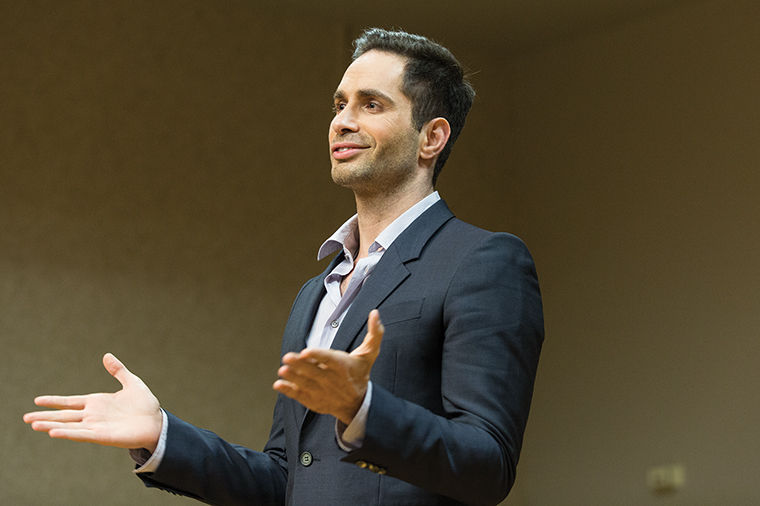Porn mogul, documentarian tells of Israel’s LGBTQ scene
Adult film director Michael Lucas speaks during an April 23 screening of his film, “Undressing Israel.”
April 27, 2015
Noted adult film director Michael Lucas, founder and CEO of Lucas Entertainment, one of the world’s largest gay pornography companies, visited the college April 23 to showcase a different side of his career in the film industry: documentaries.
The event was associated with Chicago Israel Week, a series of events at colleges throughout Chicago that commemorate Israel’s Independence Day. Lucas attended the college’s screening of his 2012 documentary, “Undressing Israel: Gay Men in the Promised Land,” at the 1104 S. Wabash Ave. Building and spoke with students and outside guests about the country’s progressive laws and attitudes toward the LGBTQ community.
The documentary, which includes interviews with gay Israeli men, discusses the evolution of legal rights and focuses on a wide variety of topics regarding the LGBTQ community in Tel Aviv, including the openness of its military, the legalization of same-sex marriage and the city’s thriving LGBTQ culture and nightlife.
“When they go to Israel, people will ask me ‘[Should I] be afraid? Is it dangerous? Why are you there?’ and that’s why I decided to do this film, because people actually don’t know anything about Israel but the conflict with the Palestinians,” he said.
Lucas said he created the documentary out of a passion for the subject and not with the goal of making a profit.
“It is so easy to make an adult movie,” Lucas said. “You put very little money into it, you make it in five days and then you make good money off it. You don’t make a documentary [to] make a profit because you will not be able to return money at all. I’ve never seen a dime from the Israeli documentary—I thought I would return 10 percent—but I went into it knowing this is my gift to Israel.”
As a small country, Lucas said Israel does not have the funds to promote a positive image on the global scale. He said he wanted to show people a different side of the country rather than the violence that he said is often portrayed in the media due to their political conflicts with other countries.
Lucas is often asked why he chose not to mention the country’s conflicts with its neighboring countries. He said he was not obligated to discuss that aspect of Israeli politics, nor did he want to.
“If I were to make a movie about occupation, no one will ask me, ‘Why didn’t you show how progressive [Israel is] when it comes to gay rights?’” he said. “People cannot imagine and are very upset that the movie is not showing the war. This is not the topic. This was not the portrayal of Israeli society at large. I chose a very specific subject.”
Lucas said most LGBTQ film festivals—including those in Tel Aviv—would not screen his movie because of Israel’s negative image in the media. However, he said his film positively affected the community.
“A lot of gay people went to Israel,” he said. “I have so many people who emailed me and went on my social networks and told me that they were thankful for my film and after [watching] this movie they decided to go.”
Edon Valdman, secretary of Columbia’s Students Supporting Israel organization and a sophomore audio arts & acoustics major, said the student group wanted the college’s contribution to Chicago Israel Week to not only relate to the arts, but also be relevant to the campus’ diverse student population.
Valdman said he suggested screening “Undressing Israel” to the group’s president after hearing about the film at a pro-Israel conference. He also said SSI discussed other movies but considered the documentary a good fit for Columbia because the students involved wanted to find a film that would grab their peers’ attention.
“People would assume that in Israel, maybe the gay population isn’t so large or has their own issues,” Valdman said. “Even I had misconceptions about the gay community in Israel, and when I watched the movie for the first time, it was really enlightening. Just the idea of a movie about the gay population in Israel, it comes off as very interesting.”
Films like Lucas’ that show Israel in a progressive light are important because they represent a more accepting community that the organization is working toward, said Laurie Grauer, executive director of Gesher Chicago, an organization that provides opportunities for LGBTQ Jews to connect to Chicago’s larger Jewish community and co-sponsor of the event.
“There are different pockets within the Jewish people that say, ‘Because of biblical reasons, we can’t have gay people be part of our everyday life’ or ‘Love the sinner but hate the sin’ in some communities still to this day,” Grauer said. “But here, it’s in Israel—the land of our home, the land of our souls, the place that [we face] when we wake up every day and pray. It’s like, ‘This is the city where it’s OK to be gay, get over yourself.’”








